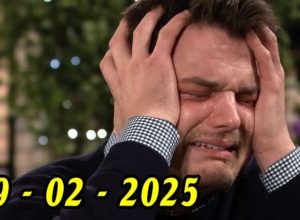In the hallowed halls of Newman Enterprises, Victor Newman, the titan who has ruled over his corporate empire with unmatched authority, now finds himself at the mercy of an unseen adversary, a shadowy figure whose presence looms like a storm on the horizon. This mysterious opponent, known only as Aristotle Dumas, has emerged from the depths of secrecy, quietly positioning himself as a force that could shatter the foundations of everything Victor has built.
For decades, Victor has navigated the cutthroat world of business with cold precision, outmaneuvering rivals, weathering betrayals, and maintaining control over his family and the empire he’s constructed. But Aristotle Dumas is different. He is an enigma, a master of psychological warfare, and the very idea that someone could manipulate events behind the scenes without leaving a trace has unnerved even the most composed of men. As Victor feels the ground shift beneath him, a deep uncertainty creeps in—a sense of vulnerability he has never known.

The origins of Aristotle Dumas are as elusive as his tactics. References to him have surfaced sporadically over the years—whispers in boardrooms, rumors of a failed deal, and a clandestine partnership that never materialized. Yet no one truly knows who he is, or what he wants. He is a ghost in the corporate world, leaving no footprint to trace, but his influence is undeniable. It’s this very mystery that has captured the imagination of viewers and left Victor on edge. Could Aristotle be a new player, an outsider with a personal vendetta against Victor and Newman Enterprises? Or could he be a face from the past, a former ally now turned enemy, operating under a new guise with a hidden agenda?
The slow build-up to Aristotle’s arrival has been a masterstroke in suspense, as cryptic messages and fleeting glimpses tease his identity. A blurred figure disembarking from a train. The flash of an expensive cufflink at an exclusive gala. A voicemail that offers little more than a chilling hint of what’s to come. Each piece of the puzzle is revealed with deliberate slowness, keeping both Victor and the audience guessing. And then there’s the pivotal moment—an unsettling message sent directly to Victor’s phone, challenging him: “You’ve underestimated me for far too long. Genoa City has another king now.” The boldness of this declaration sends a shockwave through the empire, marking the beginning of a game unlike any Victor has played before.
As the pieces fall into place, suspicions begin to surface that the first tangible link between Aristotle and Newman Enterprises might not be a faceless corporate raider, but rather someone Victor knows all too well: Billy Abbott. Billy, the troubled younger brother of Jack Abbott, has always lived in the shadow of his more successful sibling. A man of ambition, yet often overshadowed by the larger-than-life figures in his family, Billy is the perfect candidate to be manipulated by a shadowy figure like Aristotle.
Victor’s instincts tell him something is off. Billy, once the carefree playboy, is now acting erratically. His loyalties appear divided, and his behavior hints at the influence of someone whose agenda remains hidden. What Victor doesn’t know, however, is just how deep Aristotle’s reach extends, and how the invisible hand behind the curtain is playing Billy like a pawn in a much larger game. Aristotle knows how to exploit the cracks in Billy’s psyche—the insecurities that come with living in the shadow of giants, the desperation to prove himself, and the desire for power and recognition.
At first, Aristotle’s presence is subtle, his manipulations quiet and indirect. Billy receives a mysterious invitation to a private dinner, where Aristotle, in the guise of a benefactor, offers him a partnership that promises power and prestige. For the first time in his life, Billy feels seen, valued, and believed in—something that no one, not even his family, has ever truly given him. The offer is seductive, and as Billy wavers, his loyalty begins to fray. Aristotle offers him a chance to break free from the constraints of his family and forge his own path. But in doing so, Billy risks losing everything that once defined him.
As Billy grapples with the decision, Michael Baldwin, ever the cautious investigator, begins to uncover disturbing connections between Aristotle and other powerful entities in Genoa City. Aristotle’s interest extends beyond just Newman Enterprises—he’s quietly maneuvering behind the scenes, making inroads into Chancellor Winters and Abbott Enterprises as well. If his goal is to topple Victor Newman, he’s already thinking much bigger—he’s playing a long game, with the power structure of the entire city at stake.
With his influence spreading across multiple fronts, Aristotle’s plans seem poised to unfold like a masterstroke. But it’s not just corporate warfare he’s waging—it’s psychological warfare. By planting seeds of doubt and exploiting personal weaknesses, Aristotle is not only seeking to control the boardrooms of Genoa City, but also to destabilize the emotional and psychological foundations of the key players involved. Billy is just the first casualty in a much larger game.
Victor, ever the strategist, realizes he’s facing an opponent unlike any he’s encountered before. Aristotle Dumas is not someone who can be threatened, bribed, or bought out. He is a ghost, a master of manipulation who operates in the shadows, pulling the strings from behind the curtain. For the first time in years, Victor is forced to confront the possibility that he might not be the most powerful player in the game anymore.
As Aristotle’s influence spreads, the stakes escalate. Alliances are forged, betrayals are set in motion, and the foundations of Newman Enterprises begin to crack. For Victor, the question is no longer just about corporate control—it’s about survival. He must outwit a foe who has no face, no physical presence to confront, and no tangible weaknesses to exploit.
The tension reaches a fever pitch as Victor, Billy, and Aristotle engage in a high-stakes battle of wits, each maneuvering for control of the future of Genoa City. The final confrontation will not be fought with boardroom strategies or financial might, but with psychological tactics that will leave scars on everyone involved.
As the story unfolds, one question remains: who is Aristotle Dumas, and what is his ultimate goal? Is he a new enemy with a personal vendetta, or a master manipulator who has been hiding in plain sight all along? In a city built on secrets, the greatest secret of all may be the identity of the man who has been pulling the strings all along. When the final reveal comes, it promises to shake the very foundations of power in Genoa City—and change everything forever.





